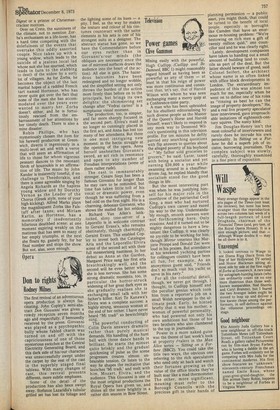Opera
Don to rights
Rodney Milnes,
The first revival of an adventurous opera production is always fascinating. John Copley's semi-abstract Don Giovanni was given a rowdy reception seven months ago and respectfully, if bemusedly received by the press. Giovanni was played as a psychopathic bully whose fabled charm was turned on and off with the capriciousness of one of those mysterious switches at the Central Electricity Generating Board, and this dark side of his/our character was unsuccessfully swept under the carpet by the rest of the cast in the superbly staged final tableau. With many changes of cast, this revival presents different, more subtle emphases.
Some of the detail of the production has also been swept away. Stefanos Lazaiidis's tubular grilled set has lost its foliage and the lighting some of its hues — a pity, I feel, as the way he makes the texture and colour of his costumes counteract with the same elements in his sets is one of his strongest suits as a designer. The abstract statue has gone, so we have the Commendatore before our eyes rather than in Giovanni's/our minds (the obliques are necessary since the use of mirrored surfaces draws the audience into the heart of the action). All else is gain. The hazardous balconies have been redesigned and no longer wobble, and the simplified setting not only throws the burden of the action more firmly than before on to the principals, but brings its own delights: the shimmering set change after "Vedrai carino" is a sumptuous visual moment.
The production, too, is simpler, and far more sharply focused in the second part. Elvira's maid is no longer so cunningly placed in the first act, and Anna has lost too many of her attendants. But there is one most intriguing new moment: in the hectic struggle at the opening of the opera, Anna herself unsheathes Giovanni's sword, an act rich in resonance and open to any number of Freudian interpretations (some of them rather rude).
The cast is immeasurably stronger. Cesare Siepi has been a famous Giovanni for longer than he may care to be reminded, but time has taken little toll of his vocal or dramatic power, even though he was suffering from a bad cold on the first night. His is a charming, debonair Giovanni, who shows the mailed fist but seldom.
Richard Van Allen's lanklocked, slimy time-server of a Leporello is in welcome contrast to Geraint Evans's, who remains obstinately, though charmingly, Geraint Evans. This enabled Copley to invest both the Catalogue Aria and the Leporello/Elvira scene of the second act with their full mesmerisin)g nastiness. In her debut as Anna at the Garden, Margaret Price sang her first aria breathtakingly well, and the second will be even better when she is less nervous. She has some strong dramatic moments, too, in particular the horror-struck widening of her great dark eyes as she gradually realises she is exchanging small talk with her father's killer. Kin i Te Kanawa's Elvira was a complete success: a highly strung, sensuous woman at the end of her tether. I have never heard "Mi tradi" so bewitchingly sung.
The powerful conducting of Colin Davis answers dramatic rather than purely musical demands. His handling of the hunt ball with three dance bands is
brilliant. He starts the minuet quite briskly and the gradual quickening of pulse as the scene progresses creates almost unbearable tension. Or listen to the way he shapes the recitative that launches 'Mi tradi,' and melt with him, Mozart, Elvira, and the
audience. This Giovanni is one of the most original productions the Royal Opera has given us, and shines all the more brightly in a rather dim season in Bow Street.










































 Previous page
Previous page